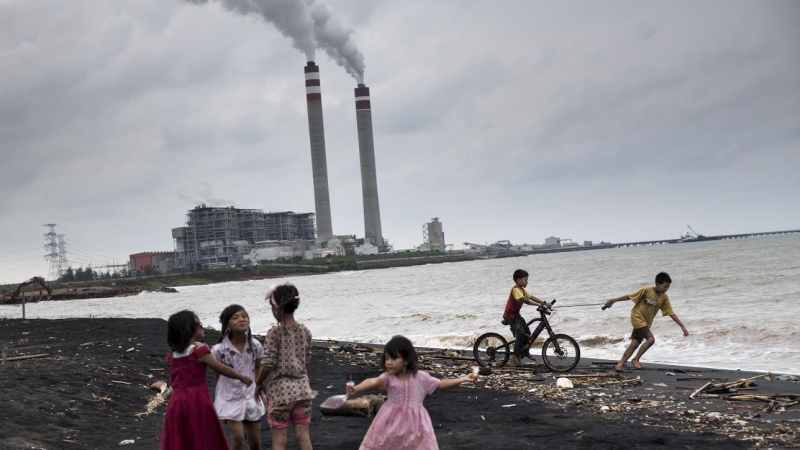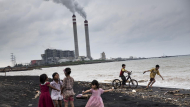Indonesia: The climate test for Crédit Agricole and Société Générale
Pierre Sagot, Head of communications, Friends of the Earth France ; Tel: +33 (0)686415343 ; email:communication@amisdelaterre.org
Lucie Pinson, Private finance campaigner, Friends of the Earth France ; Tel: +33 (0)6 79 54 37 15 ; email:lucie.pinson@amisdelaterre.org

Pierre Sagot, Head of communications, Friends of the Earth France ; Tel: +33 (0)686415343 ; email:communication@amisdelaterre.org
Lucie Pinson, Private finance campaigner, Friends of the Earth France ; Tel: +33 (0)6 79 54 37 15 ; email:lucie.pinson@amisdelaterre.org
Will Société Générale and Crédit Agricole finance the proposed expansion of the Tanjung Jati B coal power plant in Indonesia or will they withdraw from the project as BNP Paribas has already done? A paper published this week by Friends of the Earth France and Greenpeace Indonesia reveals that French banks are not applying the same rigour to the climate commitments which they adopted for the COP21 in Paris last year. The credibility of Société Générale and Crédit Agricole is on the line at their respective general meetings this week.
Five months have passed since the adoption of the Paris Agreement yet Crédit Agricole and Société Générale have still not cleaned up their portfolios. The two banks remain engaged in the construction of the expansion of the Tanjung Jati B coal power plant in Indonesia (the TJB2 project), while BNP Paribas has withdrawn from the project. [1] This is the finding of a paper published this week by Friends of the Earth France and Greenpeace: ‘Indonesia: The climate test for Crédit Agricole and Société Générale.' [2]
Lucie Pinson, Private finance campaigner at Friends of the Earth France, said:
"We are witnessing incredible hypocrisy from the banks. On the one hand Crédit Agricole and Société Générale are committed to implementing the Paris Agreement and to aligning their activities with the 2°C trajectory. On the other, they reckon that they can just keep on financing new coal plants. It may not have a particularly impressive climate policy, but at least BNP Paribas has realised that nothing justifies project finance for Tanjung Jati B in Indonesia." [3]
According to Bondan Andriyanu from Greenpeace Indonesia:
"Indonesia is not trying to build an ultra-supercritical power plant to replace power plants with high emissions. The country's new energy plan calls for 100 new coal plants by 2019. This plan would not only more than double the country's emissions over 25 years, but it would cause the premature deaths of 28,300 people a year. Nothing has been cancelled since COP21, as if the government had never even promised at Paris to reduce its greenhouse gas emissions by 29% by 2030."
Hindun Mulaika of Greenpeace Indonesia commented:
"Crédit Agricole and Société Générale can not justify their support for coal on behalf of the development of southern countries such as Indonesia. The TJB2 project flies in the face of the needs and the best interests of the people. Roughly 5000 people mobilised in Jakarta last week to claim our right to a safe future and to demand the end of coal. Indonesia has huge potential in renewable energy and developing this to meet the needs of the population would cost a tenth of what's been spent on fossil fuel subsidies over the past 10 years." [4]
It's not too late for Crédit Agricole and Société Générale. If both banks are committed to their customer Sumitomo, the funding is not yet concluded, and there is still time to follow the example of BNP Paribas and to withdraw from the project.
Attending both banks' general assemblies on Wednesday and Thursday this week, Friends of the Earth France will also publicly ask the banks to stop all funding for coal projects and to stop providing finance for companies which continue to develop this climate-killing sector.
Notes for editors:
1. An article published in Project Finance International in January 2016 states that "two French banks - Crédit Agricole and Société Générale - have joined the group behind the banks financing the expansion of the coal plant Tanjung Jati B (TJB2) following the withdrawal of BNP Paribas."
2. The paper (in French) is available at the bottom of this page.
3. Crédit Agricole committed in September 2015 to stop funding coal power projects in high-income countries in line with World Bank guidelines and Société Générale announced two months later the end of its support for such projects in OECD high income countries. According to the Global Coal Plant Tracker database, 6.5% and 4.1% of coal power projects planned since 2010 are located in these countries.
4. The mobilisations took place as part of the BreakFree protests, a wave of citizen actions fighting against the extraction of fossil fuels, starting with coal. In March this year Indonesia's Minister of Energy and mineral resources pointed out the country's renewable energy potential, see this page.

